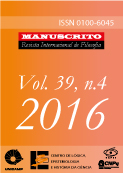Resumo
Tensism is the view that tense is not merely a property of language and the mind (narrowly individuated), but of the world itself. Perspectivalism extends this idea to all perspectival properties be they person (e.g. first person vs. second) or locational (e.g. here vs there). One challenge that perspectivalism faces is the problem of expressing the contents of the beliefs and utterances of persons that are in other perspectival positions. One proposed solution to this problem is to allow for semantic theories that “realign” the expression of contents so that the contents expressed by persons in other perspectival positions can be re-expressed from one’s own perspectival position. In this paper I argue that a similar semantic realignment strategy could be deployed in helping perspectivalists generally (and presentists in particular) come to grips with a puzzle raised by the Special Theory of Relativity. In short, the strategy is to realign the expression of contents in another inertial frame so that they are expressed from within your inertial frame. As we will see, the strategy is not puzzle freeReferências
ANSCOME, G.E.M. “The First Person,” In S. Gutenplan (ed.) (1975), Mind and Language: Wolfson College Lectures 1974, Oxford: Clarendon Press, 1975, 45–64.
BRANQUINHO, J. “On the Persistence of Indexical Belief.” Paper given to the APA Eastern Division Meeting, Dec., 2005, revised 2006. Available online at http://www.joaomiguelbranquinho.com/uploads/9/5/3/8/9538249/persistence.pdf. Last accessed, Sept. 15, 2016.
BURGESS, J. “Basic Tense Logic,” in D. Gabbay and F. Guenthner (eds.) (1984), Handbook of Philosophical Logic Vol. 2. Dordrecht: D. Reidel, 89-133. VANS, G. “Understanding Demonstratives.” In Collected Papers. Oxford: Oxford University Press, pp. 291-321, 1996.
FINE, K. “Tense and reality”. In Kit Fine (ed.) (2005), Modality and Tense: Philosophical Papers. Oxford: Clarendon Press, pp. 261–320.
FREGE, G. "The Thought." Trans. by A.M. and M. Quinton, Mind 65, 289-311, 1956.
HAWTHORNE, J. “Comments on Transient Truths: An Essay in the Metaphysics of Propositions (Berit Brogaard).” Inquiry 58, 619-626, 2015.
HECK, R. 2002. “Do Demonstratives have Senses?"” Philosophers' Imprint 2, #2, . Last accessed Sept. 15, 2016.
HOFWEBER, T. and M. LANGE “Fine’s Fragmentalist Interpretation of Special Relativity.” Noûs, 2016. DOI:10.1111/nous.12150
KRIPKE, S. Wittgenstein on Rules and Private Language. Cambridge: Harvard University Press, 1982.
LUDLOW, P. The Philosophy of Generative Linguistics. Oxford: Oxford University Press, 2011.
LUDLOW, P. Living Words: Meaning Underdetermination and the Dynamic Lexicon. Oxford: Oxford University Press, 2014.
MCDOWELL, J. Mind and World. Cambridge: Harvard University Press, 1996.
MACH, E. The Analysis of Sensations. New York: Dover, 1959.
MCTAGGART, J. "The Unreality of Time." Mind 68, 457-474, 1908.
MCTAGGART, J. The Nature of Existence. Vol. 2, Cambridge: Cambridge University Press, 1927.
PERRY, J. "Frege on Demonstratives," Philosophical Review 86, 474-497, 1977.
PRIOR, A.N. "Thank Goodness That's Over." Philosophy 34, 12-17, 1959.
PRIOR, A.N. Past, Present and Future. Oxford: Oxford University Press, 1967.
RÖDL, S. Self-Consciousness. Cambridge: Harvard University Press.
WILLIAMSON, T., 2014. Modal Logic as Metaphysics. Oxford: Oxford University Press, 2007.

